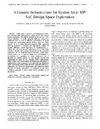Please use this identifier to cite or link to this item:
https://accedacris.ulpgc.es/jspui/handle/10553/49289
| Title: | NASA: A generic infrastructure for system-level MP-SoC design space exploration | Authors: | Jia, Zai Jian Pimentel, Andy D. Thompson, Mark Bautista, Tomás Núñez, Antonio |
UNESCO Clasification: | 3307 Tecnología electrónica | Keywords: | MP-SoC design System-level design space exploration NASA Algorithm design and analysis Topology |
Issue Date: | 2010 | Journal: | 2010 8th IEEE Workshop on Embedded Systems for Real-Time Multimedia, ESTIMedia'10 | Conference: | 8th IEEE Workshop on Embedded Systems for Real-Time Multimedia, ESTIMedia'10 | Abstract: | System-level simulation and design space exploration (DSE) are key ingredients for the design of multiprocessor system-on-chip (MP-SoC) based embedded systems. The efforts in this area, however, typically use ad-hoc software infrastructures to facilitate and support the system-level DSE experiments. In this paper, we present a new, generic system-level MP-SoC DSE infrastructure, called NASA (Non Ad-hoc Search Algorithm). This highly modular framework uses well-defined interfaces to easily integrate different system-level simulation tools as well as different combinations of search strategies in a simple plug-and-play fashion. Moreover, NASA deploys a so-called dimension-oriented DSE approach, allowing designers to configure the appropriate number of, possibly different, search algorithms to simultaneously co-explore the various design space dimensions. As a result, NASA provides a flexible and re-usable framework for the systematic exploration of the multi-dimensional MP-SoC design space, starting from a set of relatively simple user specifications. To demonstrate the distinct aspects of NASA, we also present several DSE experiments in which we, e.g., compare NASA configurations using a single search algorithm for all design space dimensions to configurations using a separate search algorithm per dimension. These experiments indicate that the latter multi-dimensional co-exploration can find better design points and evaluates a higher diversity of design alternatives as compared to the more traditional approach of using a single search algorithm for all dimensions. | URI: | https://accedacris.ulpgc.es/handle/10553/49289 | ISBN: | 9781424490868 | DOI: | 10.1109/ESTMED.2010.5666979 | Source: | 2010 8th IEEE Workshop on Embedded Systems for Real-Time Multimedia, ESTIMedia'10 (5666979), p. 41-50 |
| Appears in Collections: | Actas de congresos |
SCOPUSTM
Citations
41
checked on Jun 8, 2025
Page view(s)
137
checked on Jul 12, 2025
Download(s)
191
checked on Jul 12, 2025
Google ScholarTM
Check
Altmetric
Share
Export metadata
Items in accedaCRIS are protected by copyright, with all rights reserved, unless otherwise indicated.
